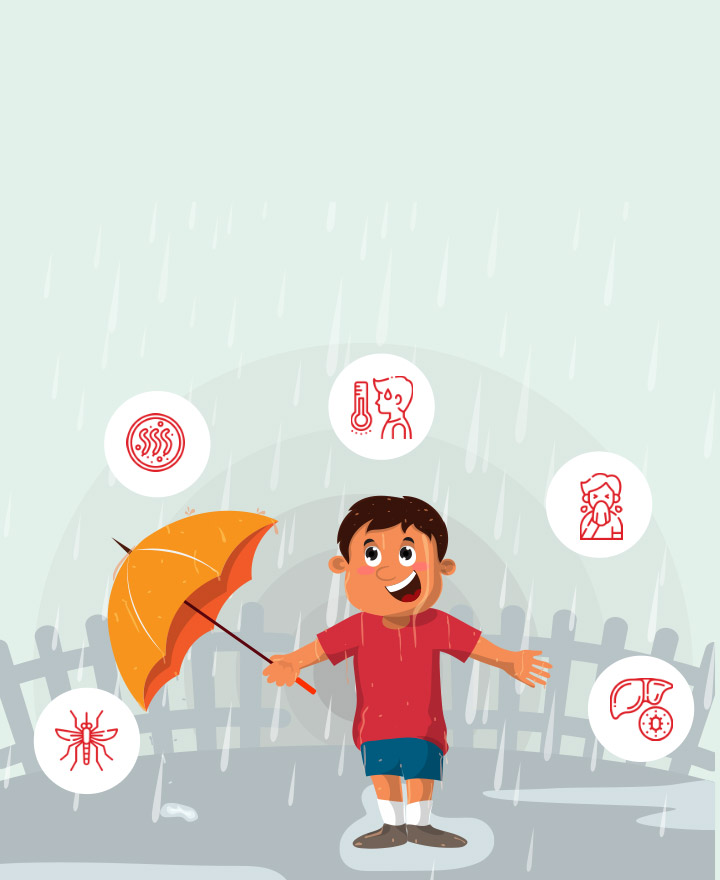

Why does Cholera Outbreak In Rainy Season?
Cholera outbreaks have long been associated with the monsoons in many parts of the world, particularly in regions with inadequate sanitation infrastructure and limited access to clean water. This blogs talks about the link between cholera and the rainy season, and the factors contributing to its outbreak.
Link Between Cholera & Rainy Season
Cholera, a waterborne disease caused by the Vibrio Cholerae bacteriu,, is closely linked to the rainy season as it monsoon creates a perfect storm of environmental conditions that favour the spread of cholera. Several factors contribute to this increased risk, such as —
A) Environmental Conditions
1. Flooding and water contamination-
Heavy rainfall normally leads to flooding, which can overwhelm sanitation systems and spread bacteria over wide areas, further contaminating drinking water supplies and food.
2. Stagnant water-
Stagnant pools of water provide ideal breeding grounds for bacteria. These waterbodies can become contaminated and serve as sources of infection.
3. Changes in water chemistry-
Rainfall in waterbodies can alter the salinity and change pH levels, creating conditions that highly favour the growth of cholera-causing bacteria. These changes can lead to rapid multiplication of the bacteria, increasing the risk of cholera outbreak.
4. Temperature fluctuations-
The combination of warmth and moisture during the rainy season can create an optimal environment for bacterial growth accelerating the reproduction rate of cholera-causing bacteria.
5. Ecological disruptions-
Heavy rains can disrupt local ecosystems and this disruption may favour the growth of harmful bacteria, including those responsible for cholera.
Sanitation Challenges
The rainy season exacerbates existing sanitation challenges, creating conditions that facilitate the transmission of cholera.
1. Exhausted infrastructure-
Heavy rainfall can exhaust sewage systems, particularly in areas with ageing or inadequate infrastructure leading overflows that can contaminate surrounding areas and water sources.
2. Compromised water treatment-
Flooding can damage or disrupt water treatment facilities, reducing their ability to provide clean, safe drinking water. This increases the risk of consuming contaminated water, a primary route for cholera transmission.
3. Inadequate waste management-
This becomes a significant issue during the rainy season, increasing the risk of water contamination and disease transmission.
4. Limited access to sanitation facilities-
This can force people to resort to unsafe sanitation practices, increasing the risk of a cholera outbreak.
FAQs
How is cholera transmitted?
Cholera is primarily transmitted through contaminated water or food. The bacteria that cause cholera can spread rapidly in areas with poor sanitation and limited access to clean, potable water.
Why are some communities more vulnerable to cholera outbreaks during the rainy season?
Communities with inadequate sanitation infrastructure, limited access to clean water, and poor waste management systems are particularly vulnerable. These issues are often exacerbated during the rainy season.
Can cholera be prevented?
Yes, cholera can be prevented through measures such as improving water and sanitation infrastructure, promoting good hygiene practices, and implementing effective waste management systems.How long does a typical cholera outbreak last?
The duration of a cholera outbreak can vary depending on factors such as the effectiveness of control measures and environmental conditions. Some outbreaks may last for several weeks or even months.
Are there any long-term solutions to prevent recurring cholera outbreaks during the rainy season?
Long-term solutions include improving water and sanitation infrastructure, implementing sustainable waste management systems, and enhancing community resilience through education and preparedness initiatives.
Conclusion
The rainy season creates ideal conditions for cholera outbreaks, highlighting the need for comprehensive prevention strategies. Cholera outbreaks during the rainy season can have far-reaching impacts on affected communities. These impacts extend beyond immediate health concerns and can affect various aspects of community life
One of the important components of our overall wellness is also being financially secured. Healthcare emergencies can happen any time, but a good health insurance policy can protect you from such uncertain situations. To know more about Wellness and other health related tips, visit the wellness corner.
Source: nih.gov, hindustantimes.com, mayoclinic.org, clevelandclinic.org
Disclaimer: This blog provides general information and discussions about health and related subjects. The information and other content provided in this blog, website or any linked materials are not intended and should not be considered or used as a substitute for medical advice, diagnosis, or treatment. Kindly contact your doctor before starting a new medicine or health regime.
Related Articles
What Causes Cholera Disease- Impact of Rainy Season
Link Between Rainfall and Cholera
Which Bacteria Is Responsible For Cholera
Cholera Bacteria Survival Duration in Water
Waterborne Diseases - Causes, Symptoms & Prevention
Published on January 7, 2025


 Health Insurance
Health Insurance  Travel Insurance
Travel Insurance  Car Insurance
Car Insurance  Cyber Insurance
Cyber Insurance  Critical Illness Insurance
Critical Illness Insurance
 Pet Insurance
Pet Insurance
 Bike/Two Wheeler Insurance
Bike/Two Wheeler Insurance  Home Insurance
Home Insurance  Third Party Vehicle Ins.
Third Party Vehicle Ins.  Tractor Insurance
Tractor Insurance  Goods Carrying Vehicle Ins.
Goods Carrying Vehicle Ins.  Passenger Carrying Vehicle Ins.
Passenger Carrying Vehicle Ins.  Compulsory Personal Accident Insurance
Compulsory Personal Accident Insurance  Travel Insurance
Travel Insurance  Rural
Rural